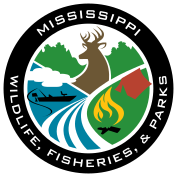
If you have questions about purchasing a license call 1-800-5GO-HUNT.
Alligators may be found all across Mississippi. They are most prevalent in the southern two-thirds of the state (south of Hwy 82). Juvenile alligators often disperse into new territories in the late spring and early summer months. During this dispersal, they occasionally find themselves in unusual locations near human development, such as; farm ponds, road ditches, highways, parking lots, yards, swimming pools, neighborhood water landscape pools, and even buildings.
Historically, the American alligator was common and abundant throughout the southeastern United States. By 1960, however, alligators had been completely eliminated from much of their former range. The decline in alligator numbers led the U. S. Fish and Wildlife Service, in 1967, to list the American Alligator as an endangered species. Shortly after the 1967 listing, surveys began to indicate that some alligator populations were more secure than was previously thought, and in the early 1970s, alligators were removed from the endangered species list in certain counties and parishes of Louisiana, Florida, and Georgia and listed instead as Threatened by Similarity of Appearance (TS/A).
The TS/A designation indicates that the American Alligator is a common and secure species, but that they are similar in appearance to other crocodilians that are very rare and endangered, such as the American Crocodile (found in south Florida) and the Chinese Alligator, which has only a few hundred individuals remaining. Within a few years of receiving endangered species protection, population surveys and increasing numbers of nuisance complaints began to indicate that the alligator populations in Mississippi and across the southeast were rapidly recovering.
Learn More
Mississippi offered its first public alligator sport hunting season in 2005. From 2005 until 2011, opportunities expanded gradually to include 480 permits on portions of two major waterways, one coastal and one inland. In 2012, Mississippi expanded sport hunting opportunities on public waters to over two-thirds of the state and in 2013 alligator hunting on public waters was opened statewide. The State was divided into 7 geographical zones with a 10-day season total of 920 available in a web-based application/drawing and permit sales process. An alligator hunting training course is provided by the Mississippi Department of Wildlife, Fisheries, & Parks. Permit holders may harvest 2 alligators over 4 feet long, only one of which may exceed 7 feet long. The bag limit restrictions are intended to distribute harvest among adults and juvenile alligators.
The mere presence of an alligator does not constitute a nuisance situation. If residences and commercial properties are located within or adjacent to habitats occupied by alligators, then interactions are sure to occur. Contrary to false information portrayed about alligators, they are not naturally aggressive towards people. In fact, they will avoid people, unless they have been fed intentionally or indirectly fed, such as by fish feeders or discarded fish remains thrown into the water.
DO NOT FEED ALLIGATORS
(It is illegal and very dangerous)
Alligators that are attracted to a regular food source placed by humans will eventually become conditioned to associate human activity with food resources. This is a recipe for certain danger. Therefore, it is illegal to feed alligators in Mississippi. Alligators that have been fed by humans, must be removed and are not suitable for relocation. To report anyone feeding alligators, contact your local conservation officer or call your local MDWFP Regional Office.
Any alligator that has preyed upon or attempted to prey upon humans, pets, or livestock, or an alligator that shows aggression and lack of fear of humans by regularly approaching human activity is considered a "nuisance alligator". To report a nuisance alligator call your local MDWFP Regional Office. For emergency alligator complaints, such as an alligator attack, or an alligator in a location that is unavoidable by humans (highway, home garage, building, parking lot, etc.) call the MDWFP Hotline at 1-800-BE-SMART (1-800-237-6278).
North Region
(662) 563-6221
(662) 563-6222
Central Region
(601) 859-3421
South Region
(601) 783-2911